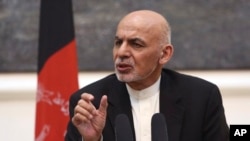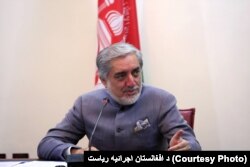This week, long-simmering political tensions between Afghanistan's top leaders spilled into the open as Afghan President, Ashraf Ghani, and his governing partner, Chief Executive Abdullah Abdullah, sharply criticized each other, raising questions about the survival of the fragile so-called national unity government.
The political dispute erupted at a time of an intensified Taliban insurgency threatening to overrun the capital of the largest province of Helmand in the south and parts of northern Afghan provinces.
Abdullah, the country's chief executive, on Thursday gave a speech in which he said Ghani was unfit to govern the country because he had failed to work collaboratively and implement pledges of introducing electoral reforms.
“You don’t have time to see your chief executive one-on-one for even an hour or two over a period of three months,” Abdullah lamented. He also complained that he had been left out of key decisions and tried to paint Ghani as arrogant and a president out of touch with the deteriorating situation in Afghanistan.
On Friday, President Ghani hit back at Abdullah through his spokesman who did not use the title of chief executive for him in the official statement.
"Unfortunately, statements made by his excellency Dr. Abdullah Abdullah yesterday were in contradiction to the spirit and morale of the governance," the spokesman said.
Ghani asserted that governance is based on principles and legal procedures, and that actions are taken in line with that.
The "national unity government will move ahead as a collection, serious discussions will be held on his [Abdullah’s] remarks in the near future," he said in a statement without elaborating further.
Ghani and Abdullah were rivals in the 2014 presidential election and both claimed to be winners after polls that many observers declared marred by fraud and irregularities.
U.S. intervention
The protracted tensions had brought Afghanistan to the verge of a damaging political rift when U.S. Secretary of State John Kerry intervened and brokered a deal between Ghani and Abdullah to end the deadlock.
Under the agreement, Ghani was installed as the president and a new post of the chief executive was created for Abdullah to equally share power in their national unity government.
It was also agreed that a electoral reforms will be introduced to prevent a repeat of the controversy-marred presidential polls and a constitutional jirga or grand assembly would be held within two years to give legal to cover to Abdullah’s office, a deadline due to expire next month.
But it is not possible to convene the jirga meeting because delay in electoral reforms have prevented authorities to hold parliamentary as well as regional elections that together form the constitutional jirga.
Rivalry between the Ghani and Abdullah camps was publicly known from the outset. But until now, both leaders brushed aside those concerns as media speculations.
In his speech the previous day, Abdullah vowed to remain part of the unity government and said he was scheduled to meet Ghani on Saturday to discuss their differences.
Afghan civil society activists, politicians and commentators in Kabul have expressed concerns over the political conformation, warning Abdullah and Ghani their dispute could push Afghanistan to a new crisis amid deteriorating nationwide security.
Taliban gains
Taliban insurgents have in recent weeks made significant gains in Helmand, the poppy producing province on the border with Pakistan. Struggling Afghan security forces have held ground in the provincial capital of Lashkar Gah and a couple of neighboring districts only with the support of American airstrikes.
International charity, MSF — Medicine Sans Frontiers — said Friday sick and injured people are struggling to reach to a 300-bed hospital facility in Lashkar Gah it is runs in partnership with the Afghan ministry of health.
“The intensification and proximity of fighting is clearly limiting access to the hospital. Patients report that roads are blocked and checkpoints are delaying reaching the hospital," said Gullhem Molinie, the country representative for MSF in Afghanistan.
The charity said it has shared the coordinates and information related to all its facilities in Lashkar Gah with all parties to the conflict. A U.S. air raid last year destroyed the only MSF hospital in Kunduz killing and wounding dozens of its staff and patients.





